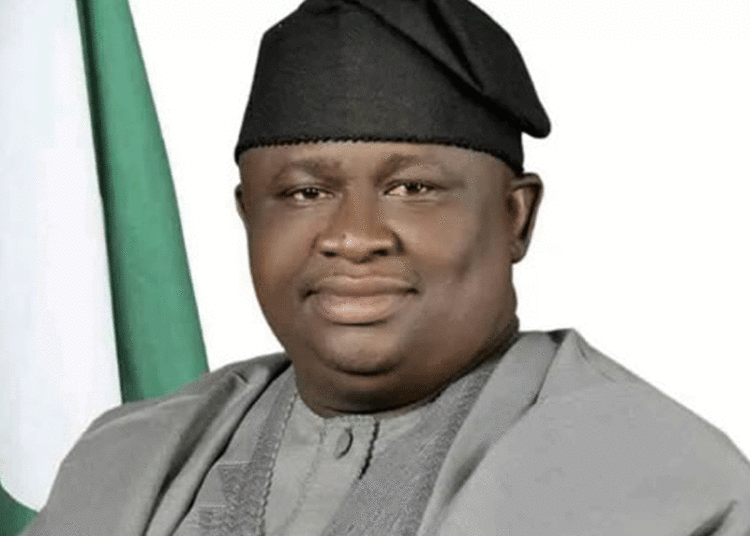Senator Solomon Adeola (APC, Ogun West), chairman of the Senate Committee on Appropriations, has applauded President Bola Ahmed Tinubu for signing four landmark tax reform bills to transform Nigeria’s fiscal landscape into law.
He stated that these reforms aim to eliminate burdensome taxes on vulnerable Nigerians, reduce tax compliance complexities, foster domestic productivity, and position the country as a preferred destination for foreign direct investment.
In a statement issued to journalists yesterday in Abuja by his media adviser, Chief Kayode Odunaro, Senator Adeola commended the leadership and members of the National Assembly for their thorough scrutiny and passage of the four tax reform bills.
He noted that the National Assembly acted in the spirit of a people’s parliament by engaging critical stakeholders and members of the public when controversies arose over certain provisions. This was achieved through robust consultations, public hearings, and expert reviews.
“This participatory process ensured that the final legislation reflects the collective interest of Nigerians, striking a balance between fiscal sustainability, equity, economic growth, and social welfare, all in line with the vision and values of President Tinubu’s Renewed Hope Agenda,” he stated.
Senator Adeola, who is also a member of the Senate Finance Committee that helped shape the laws, stated that with the enactment of these four transformative tax laws—the Nigeria Tax Act, Nigeria Tax Administration Act, Nigeria Revenue Service (Establishment) Act, and Joint Revenue Board (Establishment) Act—President Tinubu has once again demonstrated purposeful leadership and the political will to initiate and implement critical reforms necessary for inclusive growth and economic development.
“In specific terms, the Nigerian Tax Act provides a unified legal framework for taxation in Nigeria, reducing tax duplication and multiplicity to simplify compliance for individuals and businesses.
“The Nigeria Tax Administration Act introduces uniform procedures to ensure consistent and efficient administration of tax laws, facilitating taxpayer compliance and optimising revenue,” he said.
He further explained that the Nigeria Revenue Service (Establishment) Act, which replaces the Federal Inland Revenue Service (FIRS) with the Nigeria Revenue Service (NRS), expands the agency’s mandate to include optimising government revenues from both tax and non-tax sources.
Additionally, he said the Joint Revenue Board (Establishment) Act creates a legal framework to harmonise and coordinate revenue administration across Nigeria. It also provides for establishing Tax Appeal Tribunals and introduces the Office of the Tax Ombudsman to protect taxpayers’ rights.
“Importantly, these reforms will deliver tangible and far-reaching benefits to ordinary Nigerians. Notably, zero-rating VAT on essential goods and services, such as basic food items, education, healthcare, sanitary products, and locally manufactured pharmaceuticals, will make these necessities more affordable and accessible.
“Furthermore, individuals earning ₦800,000 or less annually are now fully exempt from personal income tax, easing the financial burden on low-income earners and increasing their disposable income,” he added.
According to Senator Adeola, the tax reform laws also provide significant relief for small businesses and start-ups. These include higher turnover thresholds for tax exemptions, streamlined registration and filing processes, and protection against multiple federal, state, and local taxation.
“Rural and underserved communities are also expected to benefit from improved allocation of tax revenues towards critical infrastructure and public services such as schools, health centres, and rural roads.”
Senator Adeola called on all well-meaning Nigerians to support President Tinubu’s Renewed Hope Agenda and fully implement these historic tax laws, which promise to enhance public welfare and promote widespread economic prosperity.
“The signs of Nigeria’s economic recovery under President Tinubu’s leadership are clear and measurable. GDP growth has rebounded to 3.86%, the fastest in three years, while national revenue has increased to ₦21.6 trillion from ₦12.37 trillion, reflecting stronger fiscal performance.
“The budget deficit has dropped from 6.2% in 2023 to 4.17% in 2025. Foreign exchange reforms have restored investor confidence, stabilised markets, and abolished the dual exchange rate regime, creating transparency and attracting over $40 billion in foreign investment. Non-oil exports have grown by nearly 40%, and Nigeria has recorded a trade surplus of ₦18 trillion,” he added.





